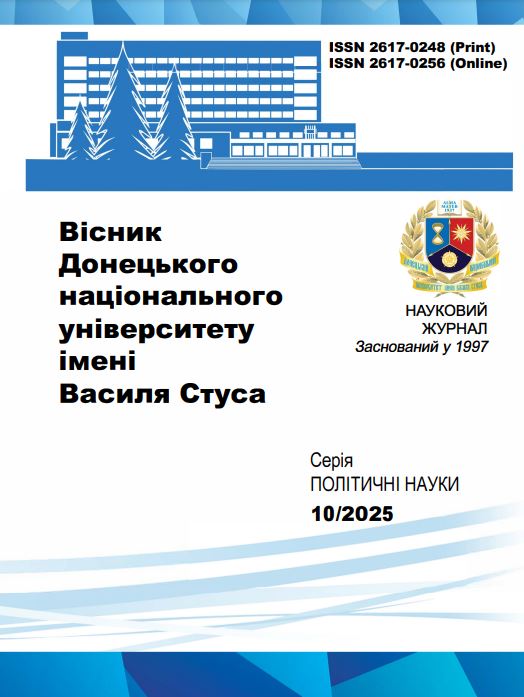Negative aspects of social victories in the system of organizational voice campaigns
DOI:
https://doi.org/10.31558/2617-0248.2025.10.7Keywords:
election campaigns, social networks, political discourse, disinformation, political communications, unfair competitionAbstract
The study is devoted to identifying the negative aspects of the use of social networks in the system of organizing election campaigns by considering cases from different countries. The cases of Brazil and India were chosen for the study, as countries where there is no totalitarian regime, which leaves the importance of the institution of elections, as a result, gives value to the construction of election campaigns. It was found that a more decentralized communication environment with greater participation of voters who are directly connected with political agents through the use of social media can contribute to populism. Considerable attention in the study is devoted to revealing the prerequisites for holding elections, the features of building communications between carriers of active and passive electoral rights. As examples of building such election campaigns for writing the article, the experience of participating in the electoral process of Jair Bolsonaro in Brazil in 2018 and BJP in India in 2019 was chosen. The case studies of Brazil and India suggest that even such promising emerging industrial countries may face significant challenges in their democratic transitions. While unfair competition, fake news, and other types of low-level political discourse and unethical political communication have existed in these countries before, social media have undoubtedly taken these problems to another level. The routinization of such political discourse in the age of social media, when such types of messages are amplified, disseminated, and replicated among populations with low levels of critical digital literacy, is certainly problematic in itself. These disturbing trends raise new questions about the ethics of contemporary political communication and the role of governments, corporations, the press, and citizens in curbing unethical political discourse, including through the dissemination of fact-checking tools among the population.
References
Гоцур О. Соціальні мережі і політичний PR в українських та закордонних виборчих кампаніях. Вісник Національного університету «Львівська політехніка». Журналістика. 2021. № 2. С. 53–57.
Швець К., Чальцева О. Digital PR-технології у передвиборчих президентських кампаніях США та Франції 2016–2017 рр. Вісник студентського наукового товариства Донецького національного університету імені Василя Стуса. 2019. Вип. 11. Т. 1. С. 28–32
Данько Ю. Соціальні мережі як засіб політичної комунікації. European political and law discourse. Vol. 2. Is. 2. 2015. С. 204–209
Araújo Bruno, Elder Prior (2021). Framing Political Populism: The Role of Media in Framing the Election of Jair Bolsonaro. Journalism Practice, 15(2): 226–242.
Mundim, Pedro Santos, Fábio Vasconcellos, and Lucas Okado (2023). Social Networks and Mobile Instant Messaging Services in the Election of Jair Bolsonaro as President of Brazil in 2018. Dados 66(2):1–37
Reuters Institute Digital News Report 2020. URL: https://reutersinstitute.politics.ox.ac.uk/sites/default/files/2020-06/DNR_2020_FINAL.pdf
Alves M. (2019). Desarranjo da visibilidade, desordem informacional e polarização no Brasil entre 2013 e 2018. Tese (Doutorado em Comunicação), Universidade Federal Fluminense, Rio de Janeiro.
Dias Lucia Moreira; Fernandes Carla Montuori. (2020). Campanha de Jair Bolsonaro para presidência em 2018: a construção do Mito Político. ECCOM, v. 11, n. 22, pp. 477–488.
Aruguete, N., Calvo, E. & Ventura, T. (2021). News sharing, gatekeeping, and polarization: a study of the #Bolsonaro election. Digit. Journal. 9, 1–23
Almeida Maria Hermínia Tavares De; Guarnieri Fernando Henrique. (2020). The unlikely president: the populist captain and his voters. Revista Euro Latinoamericana de Análisis Social y Político, v. 1, n. 1, pp. 139–159.
Chagas Viktor; Modesto Michelle; Magalhães Dandara. (2019). O Brasil vai virar Venezuela: medo, memes e enquadramentos emocionais no WhatsApp pró-Bolsonaro. Esferas, n. 14, pp. 1–15.
History and development of Bharatiya Janata Party. URL: https://www.bjp.org/historyanddevelopment
How Modi’s Supporters Used Social Media to Spread Disinformation During the Elections. URL: https://time.com/6984947/india-election-disinformation-modi/
Farooq,G (2018). Politics of fake news: HowWhatsApp became a potent propaganda tool in India. MediaWatch, 9, 106–117.
Mahapatra, S., & Plagemann, J. (2019). Polarisation and politicisation: the social media strategies of Indian political parties. (GIGA Focus Asien, 3). Hamburg: GIGA German Institute of Global and Area Studies – Leibniz-Institut für Globale und Regionale Studien, Institut für Asien-Studien

